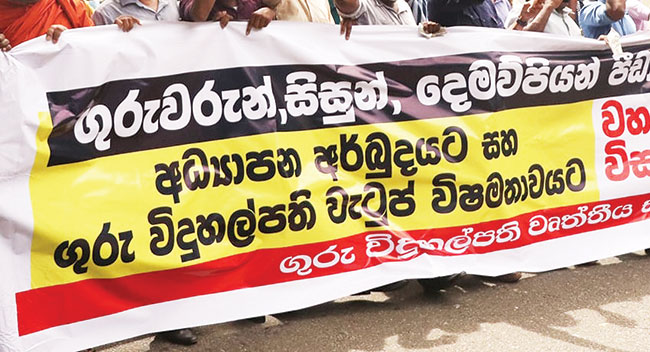Opinion
Salary anomalies and revisions

It is ridiculous to revise salaries of one group of public officers only, as such a move will have a cascading effect on the entire salary structure of not merely public servants, but also on the salaries of staff of public corporations as well, leading to more and more anomalies and strikes.
In an article of mine published in The Island of 8/7/1997 under the caption, ‘Salary Issues and strikes”, I compared the salary scales of public officers (such as those in professional and administrative grades like the SLAS) then prevailing in countries such as the UK, Canada, Australia Bahrain and Singapore. Although the comparison of the scales was limited to those of executive or staff class, the general principle regarding salary relativities and concessions like private practice are common to both executive and middle level sub professional grades.
In the absence of work study exercises (immensely time consuming) a future salaries commission should take into account, inter alia, factors like, pre-entry requirements, work volume or duty hours and offs with or without overtime, work complexity and working conditions – risks and hazards, work value (a highly subjective factor), working levels as senior management, supervisory ( number of subordinates and work responsibility, financial and others like susceptibility to dismissal and disciplinary control, political interference, responsibility for patient care, food security etc.). In the case of certain public servants, as those in the SLAS, they have to perform their duties without overtime payment. In certain cases, the pre-entry qualifications mean a competitive examination after obtaining the degree or diploma. An engineer whose pre-entry qualifications at the A. Level are as rigorous as those entering for medical studies, and are not eligible for higher salary even if he gets a doctorate, whereas a medical doctor earning a master’s degree in medical administration would be entitled to a pay hike.
In the recent case of the strike by middle level technical staff of the Health Department, the issues raised can be studied and redressed given after a study of the terms and conditions in force in India and the UK. It is the salary relativities in addition to the above-mentioned criteria that are important, since the working conditions and work environment are by and large similar.
LEO FERNANDO
Pitipana, Negomboa


